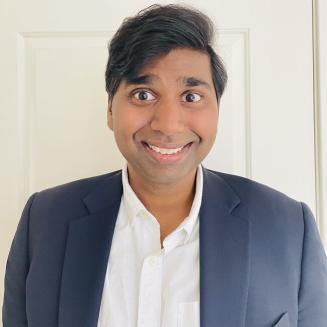OUR PEOPLE
Education and Training
Duke University,Durham, NC, B.S. - 05/2004 Biology
University of Oxford,Oxford, UK, M.Sc - 08/2006 Immunology
Weill Cornell/ Rockefeller/ Sloan-Kettering Institute,New York, NY, MD-PhD - 05/2014 Medicine
Yale School of Medicine/Yale New Haven,New Haven, CT 06/2015 Internship
Brigham & Women's Hospital/Harvard Medical School,Boston, MA 06/2021 Residency
Overview
Sandeep (Sunny) P. Kishore is a physician-scientist and Associate Professor at UCSF who is committed to transforming how we predict, prevent and control chronic disease. His work lies at the convergence of digital innovation, population health and precision medicine to build systems that proactively intervene when it counts most.
At UCSF, he serves as the clinical lead for Jupyter Health, heading a cross-functional team focused on shifting care for conditions like hypertension, obesity and diabetes from reactive to proactive. His team focuses on interpretable data from wearables, digital biomarkers and personalized decision algorithms across the disease continuum.
He co-led the development of a scalable treatment algorithm to drive the digital transformation of blood pressure control across the University of California, the nation’s largest academic health system, encompassing 10 hospitals and 1,000 care delivery sites.
Previously, he modernized the WHO Essential Medicines List to include tools for early, equitable access to chronic disease medications and served as a technical advisor to Resolve to Save Lives targeting the prevention of 100 million deaths through improved cardiovascular health. He also founded the Young Professionals Chronic Disease Network, the world’s first and largest network of early career health professionals focused on chronic disease prevention and control.
He has authored over 70 articles in esteemed medical journals including NEJM, JAMA and The Lancet as well as in popular publications such as Scientific American, and has spoken at TEDMED and the United Nations. His honors include the Sarber Award for the top PhD student in microbiology at the American Society of Microbiology, selection as an Emerging Leader at the National Academy of Medicine, a Fellow at the MIT Dalai Lama Center, and as a Paul & Daisy Soros Fellow for New Americans. He completed his MD-PhD at Weill Cornell/Rockefeller/Sloan-Kettering, master’s at Oxford as the Usher Cunningham Scholar and clinical training in internal medicine at Yale and at Harvard’s Brigham & Women’s Hospital.
At UCSF, he serves as the clinical lead for Jupyter Health, heading a cross-functional team focused on shifting care for conditions like hypertension, obesity and diabetes from reactive to proactive. His team focuses on interpretable data from wearables, digital biomarkers and personalized decision algorithms across the disease continuum.
He co-led the development of a scalable treatment algorithm to drive the digital transformation of blood pressure control across the University of California, the nation’s largest academic health system, encompassing 10 hospitals and 1,000 care delivery sites.
Previously, he modernized the WHO Essential Medicines List to include tools for early, equitable access to chronic disease medications and served as a technical advisor to Resolve to Save Lives targeting the prevention of 100 million deaths through improved cardiovascular health. He also founded the Young Professionals Chronic Disease Network, the world’s first and largest network of early career health professionals focused on chronic disease prevention and control.
He has authored over 70 articles in esteemed medical journals including NEJM, JAMA and The Lancet as well as in popular publications such as Scientific American, and has spoken at TEDMED and the United Nations. His honors include the Sarber Award for the top PhD student in microbiology at the American Society of Microbiology, selection as an Emerging Leader at the National Academy of Medicine, a Fellow at the MIT Dalai Lama Center, and as a Paul & Daisy Soros Fellow for New Americans. He completed his MD-PhD at Weill Cornell/Rockefeller/Sloan-Kettering, master’s at Oxford as the Usher Cunningham Scholar and clinical training in internal medicine at Yale and at Harvard’s Brigham & Women’s Hospital.


